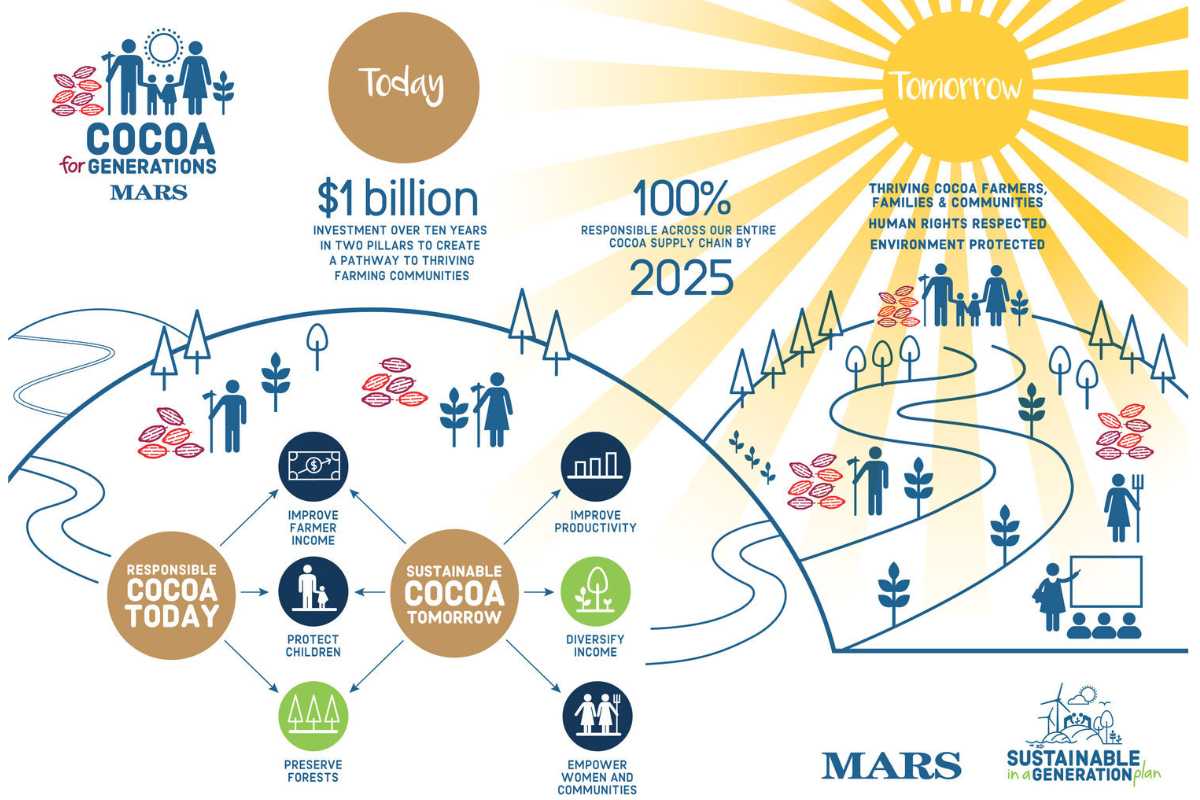CHICAGO, U.S. — Mars Wrigley Confectionery, one of the world’s largest buyers of cocoa, has launched a new plan for overhauling its cocoa supply chain.
Called Cocoa for Generations, the plan places the interest of the smallholder farmer at its center, helps to safeguard children and forests, and creates a pathway for cocoa farmers and cocoa-growing communities to thrive.
Cocoa for Generations is backed by an investment of $1 billion over 10 years and is incremental to the Sustainable in a Generation Plan investment Mars announced last year.
“For nearly 40 years we’ve been working to achieve sustainable cocoa production,” said John Ament, Global Vice President – Cocoa, Mars Wrigley Confectionery.
“While we’ve made progress, including reaching nearly 180,000 farmers with sustainability certification, we are impatient with our pace of progress and of the cocoa sector overall. We don’t have all the answers but our first step is to put the farmer at the center of our ambitions and actions. We plan to inspire others and work together to ensure Cocoa for Generations.”
Despite significant progress, farmers haven’t experienced improvements in their incomes or living conditions at an adequate pace. Children continue to labor in hazardous conditions and deforestation continues with farming occurring in protected forest areas. Mars believes a step change is needed where business, civil society and government must think and act differently, and take a new approach that creates a pathway for cocoa farmers, their families, and communities to thrive.
Cocoa for Generations consists of two pillars:
Responsible Cocoa Today
Through its first pillar, Mars aims to have 100 percent of its cocoa from the Responsible Cocoa program responsibly sourced globally and traceable by 2025. Responsible Cocoa means having systems in place to address deforestation, child labor and higher incomes for farmers.
Specifically, it expects farms that are part of our Responsible Cocoa program to provide satellite based GPS locations for farms that supply its cocoa so that we have assurances that such cocoa does not come from protected forest areas. Mars will work with suppliers and certifiers to enhance the child labor monitoring and remediation programs (CLMRS) deployed in its Responsible Cocoa supply chain, and continue to help improve education in cocoa-growing communities, with a focus on access to and quality of schools.
In addition, Mars will work with partners to ensure that the model for premiums the company pays for responsibly-produced cocoa is overhauled to ensure that farmers receive a higher share of the premium. Mars will explore and encourage further sector-wide changes and partnerships that can bring about increased income for farmers.
Mars’ new approach to cocoa goes beyond the current level of certification standards and practices and is a step change from the initial commitment Mars made in 2009.
While this new approach is implemented, Mars will maintain its current certified cocoa levels with the Rainforest Alliance and with Fairtrade and work with both organizations as they continue to strengthen implementation to raise the bar across the cocoa sector. Mars applauds both certification organizations’ efforts to organize individual farmers into groups and cooperatives, providing training and implementing management systems in certified farmer groups, and is committed to collaborate with them to improve audit controls, child labor monitoring, traceability and premiums paid to farmers. As further measurable efforts are made, Mars will continue transitioning its cocoa volumes to these new and stronger approaches.
Fairtrade says: “We applaud Mars for recognizing the role of the smallholder farmer at the heart of any ambitious plan in cocoa sustainability. Without progress on incomes for these farmers, sector-wide transformation is not possible. We need more companies showing leadership on issues in this way, which is why we are excited at the prospect of continuing to work with Mars to grow our impact in a way that delivers more for the company, whilst putting farmers first.”
Rainforest Alliance says: “We can all agree there needs to be a change on the ground for farmers, their families and forests,” said Britta Wyss Bisang, Chief of Sustainable Supply Chains for the Rainforest Alliance. “We commend Mars for deepening their commitment to cocoa producers, and for recognizing that step-change in action on the ground is needed. We look forward to furthering our relationship with Mars as this is well aligned with our new strategy, which puts more focus on collaboration between producers, NGO’s, companies and governments.”
Sustainable Cocoa Tomorrow
Through its second pillar, Mars hopes to demonstrate that a step-change in farmer income and livelihoods is possible. In partnership with an initial global group of 75,000 cocoa farming families and cocoa suppliers, Mars plans to test ways to increase productivity, income, resilience, and overall sustainability through crop and income diversification, gender programs, village and savings and loan models and farm development plans.
In parallel, Mars will work with the industry, governments and other civil-society partners to seek shared solutions and mutually-beneficial results for cocoa farming families. Mars will continue to collaborate pre-competitively with its peers and with suppliers to accelerate shared learning via industry forums including the World Cocoa Foundation and their CocoaAction platform and the International Cocoa Initiative.
















